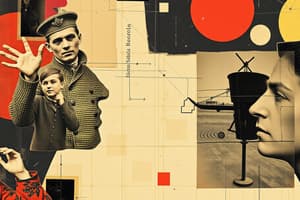Podcast
Questions and Answers
What is the primary skill required in the 21st century due to the interwoven system of media technologies?
What is the primary skill required in the 21st century due to the interwoven system of media technologies?
- Communication skills
- Critical thinking
- Media literacy (correct)
- Information analysis
According to Firestone (1993), what are the key aspects of media literacy?
According to Firestone (1993), what are the key aspects of media literacy?
- Creation, publication, and dissemination
- Accessibility, credibility, and transmission
- Transmission, reception, and interpretation
- Accessibility, analysis, evaluation, and creation (correct)
What is the term coined by Lynch (2018) to refer to all electronic or digital means and print or artistic visuals used to transmit messages?
What is the term coined by Lynch (2018) to refer to all electronic or digital means and print or artistic visuals used to transmit messages?
- Visual literacy
- Digital literacy
- Media information literacy
- Media (correct)
What is the role of media in active learning strategies?
What is the role of media in active learning strategies?
What is the outcome of integrating media literacy into the curriculum?
What is the outcome of integrating media literacy into the curriculum?
What is the purpose of conducting a research survey on media literacy integration?
What is the purpose of conducting a research survey on media literacy integration?
What is the primary goal of media literacy in education?
What is the primary goal of media literacy in education?
What is a key aspect of media literacy according to the Ontario Ministry of Education?
What is a key aspect of media literacy according to the Ontario Ministry of Education?
What is a common thread among all media literacy concepts?
What is a common thread among all media literacy concepts?
Which of the following is NOT a concept of media literacy?
Which of the following is NOT a concept of media literacy?
According to Hobbs, what is a key aspect of media literacy?
According to Hobbs, what is a key aspect of media literacy?
What is the ultimate goal of media literacy in a democratic society?
What is the ultimate goal of media literacy in a democratic society?
Flashcards
Media Literacy Definition
Media Literacy Definition
The ability to access, analyze, evaluate, and create media of different formats (print, visual, audio, and interactive).
Media Literacy Importance
Media Literacy Importance
Essential skill for critically evaluating media information and creating content.
Media Literacy Skills
Media Literacy Skills
Skills to access, decode, evaluate, analyze, and produce media (both print and electronic).
Media Representation
Media Representation
Signup and view all the flashcards
Critical Media Evaluation
Critical Media Evaluation
Signup and view all the flashcards
Media's Role in Society
Media's Role in Society
Signup and view all the flashcards
Media Integration in Education
Media Integration in Education
Signup and view all the flashcards
Media Technologies
Media Technologies
Signup and view all the flashcards
Critical Thinking Skills
Critical Thinking Skills
Signup and view all the flashcards
Media Research Implications
Media Research Implications
Signup and view all the flashcards
Media Literacy Tools
Media Literacy Tools
Signup and view all the flashcards
Media Education
Media Education
Signup and view all the flashcards
Study Notes
Media Literacy
- Media literacy refers to the ability to access, analyze, evaluate, and create media, encompassing various forms such as print, visual, audio, and interactive media.
- It is considered an essential skill in the 21st century, as information is disseminated through an interwoven system of media technologies.
Definition and Importance
- Media literacy involves critically assessing the accuracy and validity of information transmitted by the mass media and producing information through various forms.
- It is also known as Media Education, which enables individuals to realize that all kinds of media show a representation of reality.
- The Ontario Ministry of Education (1989) emphasizes that media literacy helps students develop an informed and critical understanding of the nature of mass media, their techniques, and their impact.
Aspects and Dimensions
- Media literacy includes the ability to understand how media work, produce meaning, and construct reality.
- It involves the process of accessing, decoding, evaluating, analyzing, and creating both print and electronic media.
- It depicts the experience of reading texts and designing hypertexts made possible through technology.
- Media literacy also pertains to understanding how to use today's technology, operate equipment, use various software, and explore the internet.
Roles and Integration
- Media literacy is an effective and engaging way to apply critical thinking skills to a wide range of sources.
- It is included in educational standards in language arts, social studies, health, science, and other subjects.
- Media literacy can be integrated into the curriculum, teaching critical media management strategies, including ICTs in schools and learning centers.
Critical Evaluation and Skills
- Critical evaluation of media requires the ability to analyze and disseminate various features to others.
- Media literacy builds understanding of the role of media in society, as well as the essential skills of inquiry and self-expression necessary for democratic citizens.
- It represents a response to the complexity of the ever-changing electronic environment and communication channels.
Research and Implications
- Research abstracts on media literacy have implications on teaching-learning processes.
- Conducting research surveys on media literacy integration can provide valuable findings and recommendations.
Studying That Suits You
Use AI to generate personalized quizzes and flashcards to suit your learning preferences.




